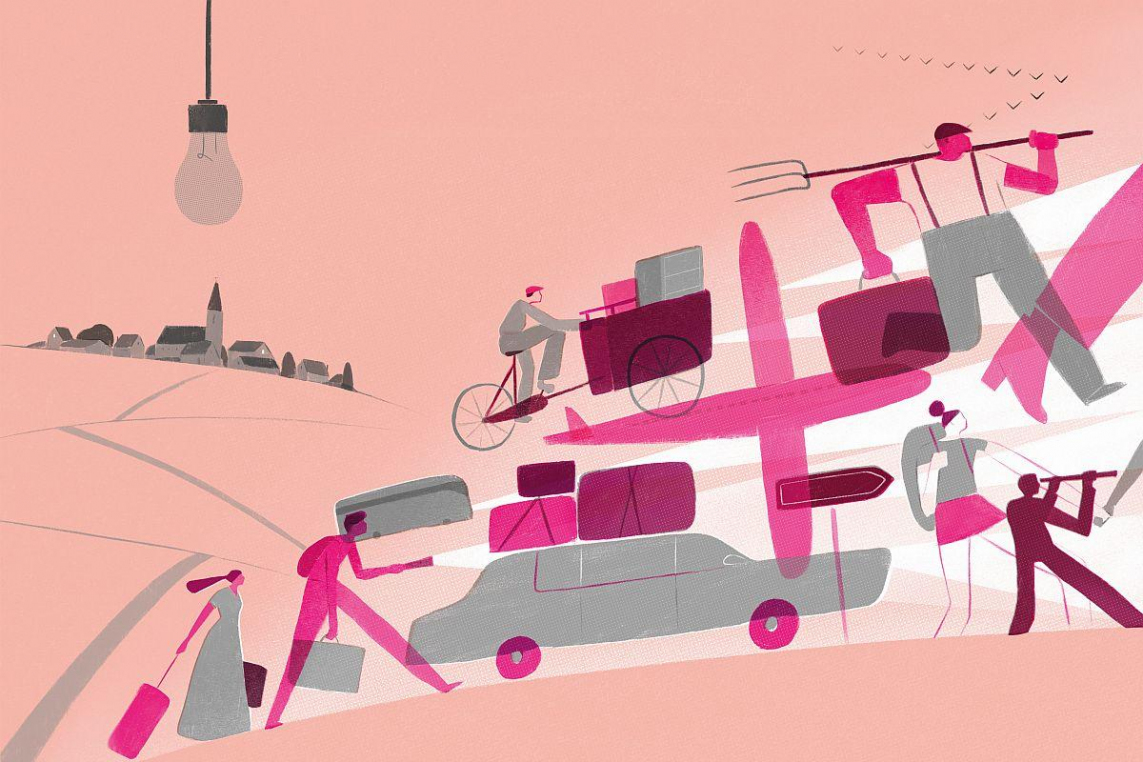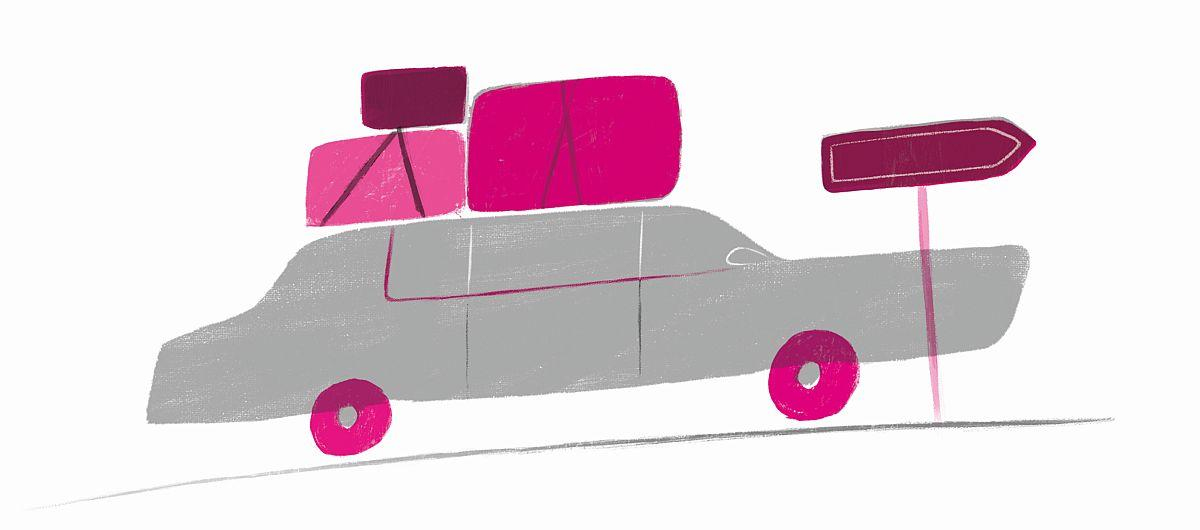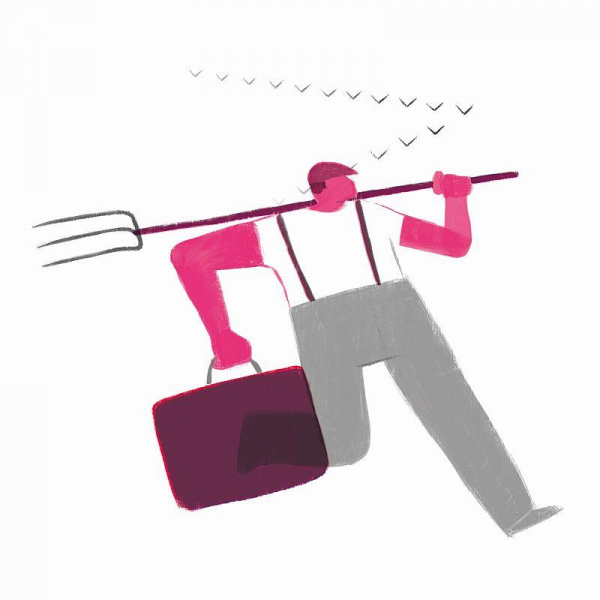Pieter Stockmans volgt het mondiale optreden van de Europese Unie, het Europese vluchtelingenbeleid, de evoluties in Midden-Europa en de regio ten oosten van de EU.
A three-headed dragon is depopulating Europe

© Maarten Peeters
A three-headed dragon is haunting Europe. It is ageing the population, causing women to have fewer children and pushing hundreds of thousands away from their homelands. Bulgaria, for example, has the fastest declining population in the world. The European Commission is putting up its defences against this threat. It appointed a first-ever and much-needed ‘Commissioner against depopulation’.
MO*talks: The depopulation of Eastern Europe [10 december online]
On Friday evening 10 December, MO* journalist Pieter Stockmans talks about the depopulation of Eastern Europe with experts from home and abroad. You can follow that conversation online. More info here.
Depopulation caused by emigration, an ageing population and a low birth rate is not only sweeping through Eastern European countries, but also large parts of France, Spain, Italy and Portugal, and even remote parts of the Netherlands. It is a pronounced European phenomenon: United Nations population statistics show Europe as the only continent that will experience a population decline in the coming decades.
Concern in Europe is growing so much that Ursula von der Leyen's European Commission appointed a separate Commissioner for the problem, Dubravka Šuica. It is no coincidence that she comes from Croatia, one of the hardest hit countries. Last year, Šuica published the Commission's first report on the impact of demographic change, which it sees as ‘one of the three major transformations shaping Europe's future', alongside climate change and the digital transition.
It is clear that the EU wants to be prepared for the coming decades. After all, Europe is becoming smaller and therefore irrelevant in the world. In the 1960s, the inhabitants of the current EU still made up 12% of the world's population; in 2070, this will only be 4%.
Three heads
Of this three-headed dragon, emigration is the head that mainly targets the ex-communist European countries. The fact that so many people are leaving has to do with the totalitarian past, according to Bulgarian MEP Radan Kanev. ‘Freedom of movement was an unattainable dream for decades, also inside the country, the Christian Democrat explains. ‘But then, suddenly, moving around became very easy. The first time was in 1989 (when the Iron Curtain fell, ed.), and the second time was when Bulgaria joined the European Union.’
‘In Bulgaria, the low birth-rate is a national problem.’
‘The educated people were the first to leave’, says Kanev. “Later followed the lower educated people and people from minority groups, such as Roma. They went to work elsewhere in the EU. The wages were low and the conditions bad, but still higher and better than in Bulgaria.’ That is the recipe for mass emigration: inequality between income levels within the same space of freedom of movement.
By 2050, Bulgaria's population will have fallen by 40%, Romania's by 30% and Croatia's by 20%. Those countries are the hardest hit, but the Commission estimates that 31 million Europeans live in rapidly shrinking regions with low-income levels.
The second dragonhead is the ageing population. The population over 65 will grow from 20 per cent today to 30 per cent in 2030, and the number of people over 80 will double. This problem is fuelled by emigration. ‘After all, it is mainly young people who move away, so the population is ageing further,’ says Kanev about his home country. ‘The average age of emigrants is a lot lower than the average age in Bulgaria.’
It makes public spending on the elderly skyrocket in EU member states. In 2019, spending on pensions and healthcare already accounted for 25 per cent of the EU's gross national product. This is expected to rise sharply.
The European Union faces a problem: more resources are needed, but fewer are available because depopulation means a smaller workforce and therefore fewer public funds to pay pensions. Moreover, the International Monetary Fund (IMF) predicts stagnant economic growth in countries with high depopulation.
This stagnation of the economy in turn feeds the third dragonhead: the low birth rate. ‘In Bulgaria, this is a national problem’, says Kanev. ‘The exodus led to a long period of economic stagnation, which encouraged women to have fewer children.’
‘To meet labour market needs, we need to attract skills and talent from abroad, through legal migration.’
In Croatia too, not enough children are being born. According to Eurostat figures, women in Croatia have on average 1.4 children per woman. In order to stop the population decline, two are needed. In 2018, Croatia recorded its lowest population since 1957: four million. The number of births that year was even lower than just after the war in the 1990s.
Since that time, Croatia has not had a single year with population growth. Moreover, the birth rate continues to decline because so many young women are emigrating.
This year, the Croatian government set up a “National Council for Demographic Revitalisation”. Officials, academics and NGOs are working together on the Strategy for Demographic Revitalisation until 2031. The government makes the case that population decline will stop in the coming years, but this is unlikely.

© Maarten Peeters
No labour forces
The exodus leads to shortages on the labour market; for example, in the care sector. Between 1996 and 2016, 13.200 nurses left Romania, most of them for the UK and Italy. Between 2009 and 2015, in just six years, Romania lost half of its doctors, mostly to the UK, Germany and Belgium.
The European Commission expects the working population in Europe to drop by almost a fifth by 2070. This will have a major impact on the economy. In its recent report on the impact of demographic change, it states: ‘To meet labour market needs, we need to attract skills and talent from abroad, through legal migration.’
Organising immigration is a sensitive issue in Central Europe, where many governments indulge in national populism and xenophobia. They primarily attract 'culturally related' migrant workers: Bulgaria seeks people who belong to the Bulgarian minority in Moldova and Macedonia, Hungary seeks Hungarians from Serbia, Poland seeks Ukrainians.
Yet, they also quietly attract Asians, often without official agreements with the home countries of these migrant workers. The Romanian journalist Adina Florea of the newspaper Libertatea warns: ‘Companies in industry, agriculture, construction, care and the hospitality industry, where labour shortages are felt, put pressure on governments to attract labour migrants from Asia.’
Central European governments are looking for circular migrants. It makes the economy work and does not require any integration policy.
‘The need is also an opportunity for those companies. Local residents have social rights and are better protected; because they emigrate, companies can employ migrant workers whose rights are not yet properly regulated.
The largest Romanian trade union has only just started a campaign to encourage migrant workers to join. That is rather late, considering the sharp increase in the annual quota of labour migrants from 3,000 to 50,000 in just five years' time.’
Exploitation is lurking around the corner, says Romanian journalist Ion Holban: ‘These immigrants are also less likely to leave the company. Without work, they often receive an immediate order to leave the territory. Often the companies even confiscate the immigrants' passports to prevent them from travelling on to Western Europe and house them in closed communities.’
According to Florea, the purpose of attracting immigrants is not to redevelop Romania's depopulated rural areas, but to help companies make more profit. ‘Those immigrants end up going to the big cities anyway. It is mainly good for the companies and for the governments.’
Central European governments are mainly looking for migrant workers who stay on the move, so-called circular migrants. They do not need to build a life in, say, Romania or Hungary, but just want to earn money. It makes the economy work and does not require any integration policy.

© Maarten Peeters
Vicious circle
Last summer, the European Commission published a 'long-term vision for rural areas'. The pressure on cities is increasing too much. That is why it wants to better connect the depopulated regions with more urbanised areas, so that there are also opportunities and so that people can live there more easily.
MEP Radan Kanev said just the opposite happened in Bulgaria, with the support of European funds: a concentration of opportunities in the cities. ‘A disproportionate amount of European funds for the development of rural areas flowed to the capital Sofia. This was due to corruption. The result was that rural areas were neglected and too many people moved to the city. As a result, there are not enough places in childcare and schools, and traffic problems in turn lead to deteriorating air quality and health problems.’
‘You could speak of a kind of “Wild West repopulation”, because depopulated areas are becoming poles of attraction for criminals.’
Meanwhile, especially the northwest of Bulgaria is emptying out. That area is in a big vicious circle. Everyone has moved to the cities or to Western Europe. There are not enough people to develop the region. Investors stay away because they cannot find workers. Even unskilled labour is now scarce. Ten years ago, the problem was unemployment, now it is labour shortages.
‘In addition, public services, such as public transport, are becoming more expensive or disappear all together because there are not enough inhabitants to use them. Major railway lines have not been maintained since the 1970s. As a result, even more people are moving away. These areas are gradually becoming places of lawlessness. You could speak of a kind of “Wild West repopulation”, because they are becoming poles of attraction for criminals.’
Kanev refuses to accept that large areas of his country have entered the feared phase of irreversible depopulation. He believes in change, even though he expects that at least a quarter of a century will be needed to help the areas recover. ‘A prerequisite is a resolute government, which has been lacking in Bulgaria for decades.’
Welcome
How do you break the destructive circle? In the Welcoming Spaces project, Utrecht University is conducting a research into how two major European problems, population decline and uncontrolled migration, can be turned into one solution: 'filling up' emptying areas with newcomers, for example people fleeing from conflicts.
‘We are doing research in Poland, Spain, Italy, the Netherlands and Germany’, says University lecturer and project coordinator Karin Geuijen. ‘In the Netherlands, we see problems in the border region of South Limburg, which still has to contend with the vanished mining industry. Shops are closing, schools are closing, younger people are leaving, older people are staying behind. Together with hospitals, employment services and educational institutions, training programmes are being drawn up to prepare newcomers for working in the care sector. It is not a miracle solution: the language and cultural differences create problems. But doing nothing is not an option either.’
‘The Spanish NGO Cepaim reasons as follows: if the refugees are not suitable, then we make them suitable.’
‘The province of Zeeland is another depopulating area. There, 6000 vacancies remain unfilled. The province now wants to recruit labour migrants from abroad. The local population is more wary of refugees than of labour migrants who are selected in a controlled way on the basis of profiles. But we are looking into how governments can still select from groups of refugees who are already in the Netherlands and who are looking for work.’
In Spain, the NGO Cepaim goes a step further. 'They reason as follows: if the refugees are not suitable, then we make them suitable. The organisation goes to the depopulated villages and asks if there is housing and what workers are needed. And it goes to the newcomers and puts the question to them. Again: an intensive process, but planting people somewhere and hoping that it will work out is not ideal either.'
Several Central European governments are not eager to populate depopulated regions with foreigners. Refugees and migrants are languishing at their borders, while they themselves are investing in “more of their own people” through birth control. By supporting young families with specific measures, they want to encourage women to have more children.
Invisible culprit
Economic and social problems are visible consequences of depopulation. But the three-headed dragon is also the culprit in many political crises the EU is going through. Few people link increasing xenophobia and the rise of authoritarianism to depopulation, but in Central Europe — and also in France — the impact can be felt in politics.
Depopulation can create feelings of alienation and loss of identity in those who stay behind, especially in combination with the arrival of new people. Some leaders exploit these feelings of fear by putting forward nativism as an answer, a policy that gives priority to the supposed interests of the ‘original’ population, often only as a cover for establishing an authoritarian government.
‘The real danger, depopulation, is ignored and replaced by an imagined danger of a scapegoat: immigrants.’
If there is little immigration, those leaders create the perception of immigration themselves in order to create a 'demographic panic'. That is the thesis of Bulgarian political scientist Ivan Krastev. ‘The real danger, depopulation, is ignored and replaced by an imagined danger of a scapegoat: immigrants’, he says.
‘They are attempts to perpetuate the power of the shrinking ethno-cultural majority. Nevertheless, depopulation is real. Are Bulgarian writers worried that in so many years there will still be enough people to read and write the Bulgarian language? Yes, they are.’
The exodus has made authoritarian leaders great. At the same time, it sucked the power out of liberal, progressive political movements. ‘Liberal political forces have seen their influence diminish, because many of their voters have left’, says Krastev.
‘It was not the level of education, unemployment or standard of living that determined who voted for authoritarian leaders in the European parliamentary elections, but where the voters lived. These leaders could count on regions from which most people left in the last decade.’
About this article
Journalist Pieter Stockmans: ‘For an earlier report I travelled through the Romanian countryside. I found the villages charming, picturesque, and idyllic. The reality was harsher: they were emptying out, there was no next generation. Later, I cycled through the French Ardennes and later still through the vast countryside of Catalonia. Often, in the picturesque villages built from ancient stones, I found no food. No shops, just desolation.
This was my first confrontation with depopulation in Europe. Invariably, I experienced a kind of melancholy. This loss of European culture and identity hurts me. In Romania, I saw how project developers wanted to turn villages into holiday resorts. This already happened in countless beautiful, deserted villages in southern Europe. They have been beautifully restored, of course. But the soul of the past, the living village, has disappeared. I decided to investigate this. In 2022, I will travel to Romania and Bulgaria, in search of the soul of forgotten Europe.’
This article was translated by Brita Vandermeulen.
Maak MO* mee mogelijk.
Word proMO* net als 2793 andere lezers en maak MO* mee mogelijk. Zo blijven al onze verhalen gratis online beschikbaar voor iédereen.
Meer verhalen
-
Report
-
Report
-
Report
-
Interview
-
Analysis
-
Report










 Oxfam België
Oxfam België Handicap International
Handicap International